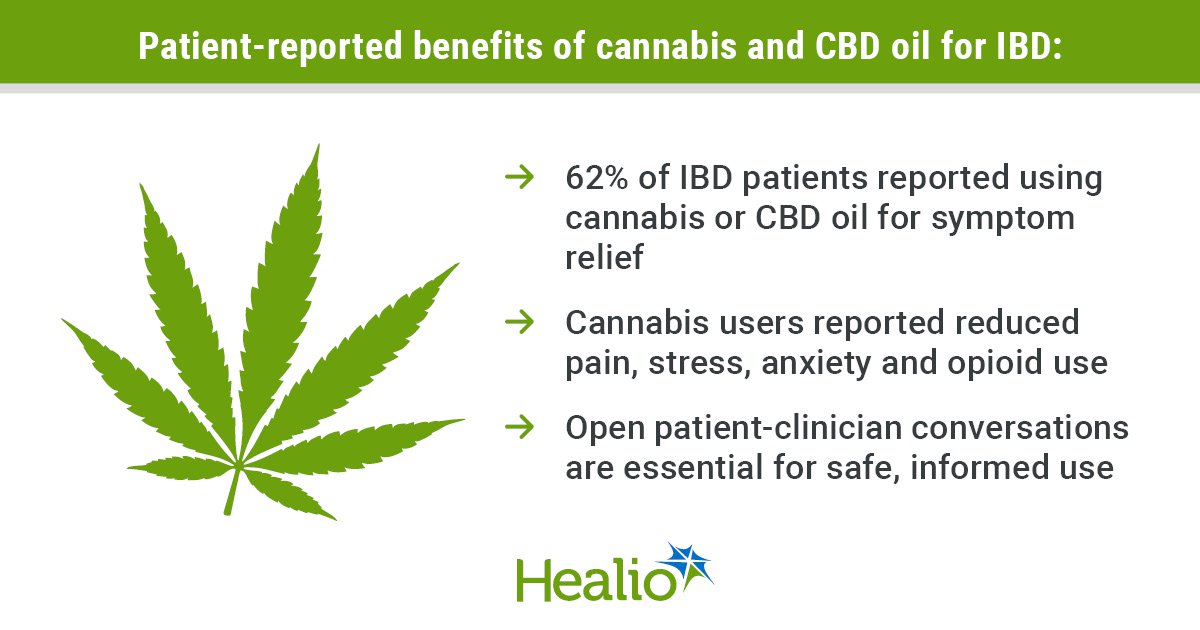August 29, 2025
3 min read
Key takeaways:
- Many patients with IBD report using cannabis or CBD for pain, stress and anxiety relief.
- Findings highlight the need for more research and open patient-clinician discussions.
A substantial number of patients with inflammatory bowel disease rely on cannabis and CBD oil for symptom relief, indicating a need for more rigorous investigation, according to a study published in Academia Medicine.
Cannabinoids, including THC and CBD, have shown preclinical benefits in reducing gastrointestinal inflammation and motility, while human trials and anecdotal accounts show a decrease in IBD symptoms and improvement in quality of life. However, few clinical trials have examined the role of cannabis for patients with IBD.

Data were derived from Lala A, et al. Acad Med. 2025;doi:10.20935/AcadMed7773.
Researchers at Case Western Reserve University investigated this using an anonymous, self-administered survey of 139 adults, of whom 106 had IBD (47.5% Crohn’s disease; 18.7% ulcerative colitis; 6.5% both; 3.6% indeterminate). Demographic and socioeconomic characteristics were balanced between patients with IBD and controls.
Participants were asked to detail their knowledge and perception of cannabis and CBD oil use as alternative treatment for digestive health. Those who responded “yes” to using cannabis or CBD oil were also asked to report frequency, mode and patterns of use, as well as perceived impact on IBD symptoms and side effects, according to the study.

Abigail Raffner
“While our results are exploratory and limited to our own patient population, there appears to be a notable proportion of IBD patients who believe that cannabis or CBD can be used for IBD symptom relief,” Abigail Raffner, PhD, RD, LD, assistant professor in the department of nutrition and the Digestive Health Research Institute at Case Western Reserve University School of Medicine, told Healio. “In this regard, clinicians should be aware that there may be a proportion of their own patients who use cannabis and/or CBD oil for the same reasons.”
Nearly two-thirds (62.3%) of patients with IBD and controls (63%) reported use of cannabis or CBD oil, and more than half in each group (61.3% and 54.6%, respectively) reported experiencing benefits in overall health and mental well-being.
The main reasons for cannabis use among patients with IBD were recreation (69.4%), pain relief (43.6%), short-term IBD symptom relief (37.1%), medical use (33.9%) and long-term IBD symptom relief (22.6%).
Of those with IBD who used cannabis, most reported experiencing relief from abdominal pain (56.7%) and other pain (70%), as well as improvement in stress (72. 9%), anxiety (60%) and nausea or vomiting (50%). In addition, 48.3% had less depression, 38.3% had fewer headaches and 13.3% had less constipation.
The effects of CBD oil were not as dramatic, although patients with IBD still reported relief in other pain (56.7%), abdominal pain (36.2%), stress (39.7%), anxiety (32.8%), depression (31%), nausea or vomiting (24.1%), headaches (22.4%) and constipation (5.2%).
Control participants who used cannabis or CBD oil also reported relief in stress (57.1% and 47.6%, respectively), anxiety (47.6% and 38.1%), other pain (42.9% and 57.1%) and depression (33.3% and 28.6%).
“Our findings align with prior surveys showing patient-reported benefits, particularly for pain and quality of life, but add nuance by demonstrating greater perceived benefits for short-term vs long-term IBD symptom control,” Raffner said.
Notably, 33.9% of patients with IBD who used cannabis or CBD oil reported reduced opioid use or induction of remission.
“Nearly one-third of patients reporting decreased opioid use was higher than expected, highlighting a potential role for cannabinoids in reducing opioid reliance,” Dr. Raffner added. “Additionally, over 70% of cannabis users reported stress relief and 60% reported reduced anxiety, despite few citing these as reasons for use. This suggests unanticipated mental health benefits, which is clinically relevant given the high burden of psychological comorbidities in IBD.”
She further emphasized the need for honest, open and nonjudgmental conversations between patients and clinicians.
“Proactively addressing patient interest, discussing potential benefits, risks and evidence gaps can improvement trust, promote safe use and help identify candidates for clinical research,” Raffner said.
For more information:
Abigail Raffner, PhD, RD, LD, can be reached at axb860@case.edu.










